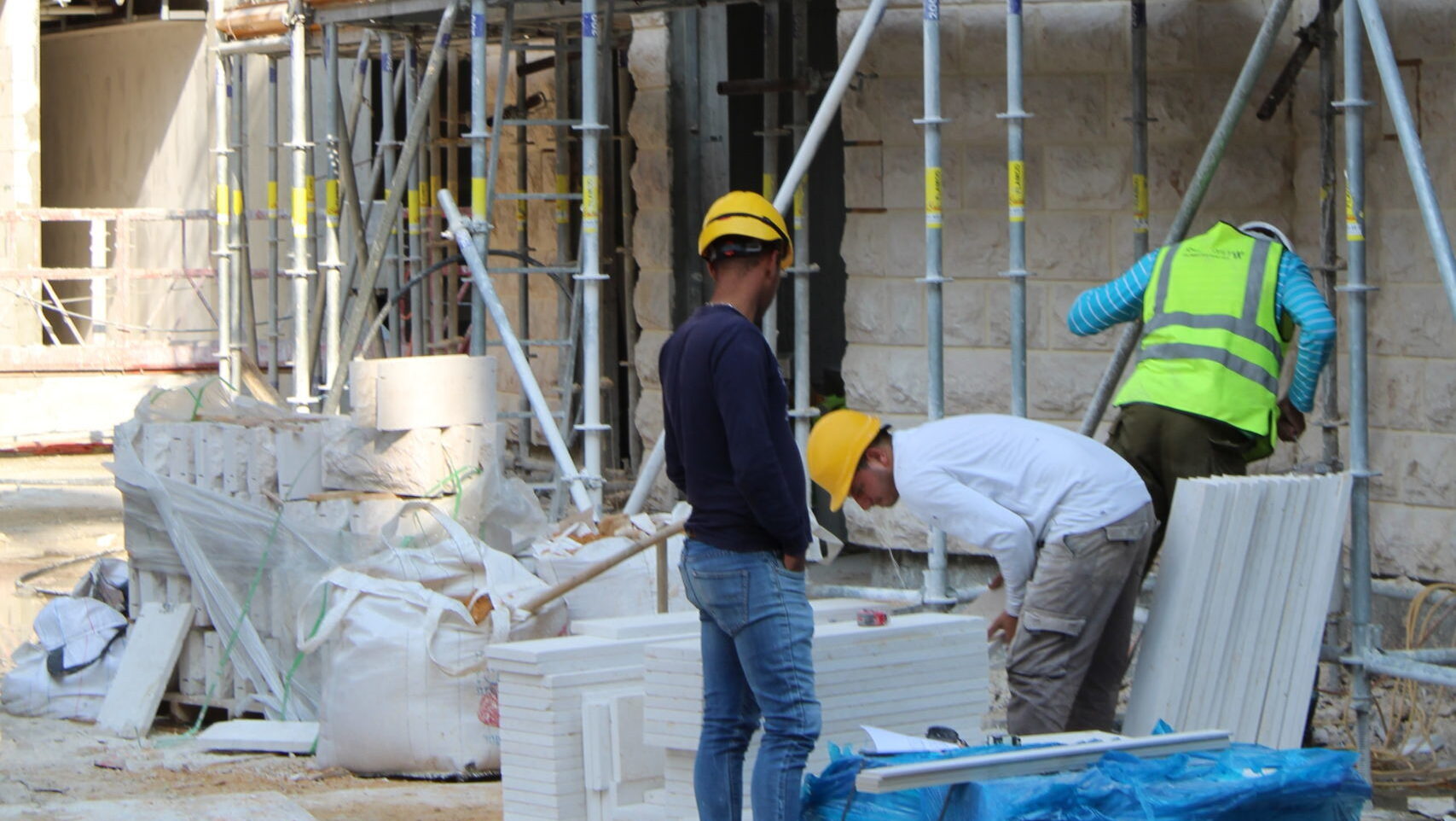War Brings Delays, Challenges to Israeli Construction Sector
The prohibition on Palestinian workers entering Israel during the war has caused hardships on both sides, with the Palestinians struggling to earn incomes and Israelis grappling with labor shortages in essential industries
Since the onset of the Israel-Hamas war on Oct. 7, Palestinian workers from the West Bank and the Gaza Strip have been prohibited from entering Israel.
With Palestinian workers primarily employed in industries such as agriculture and construction, their absence has led to challenges on both sides: The Palestinian workers are struggling to earn livelihoods, while Israeli business owners are grappling with a significant shortage of labor in essential projects.
Last week, the Israel Defense Forces Central Command decided to allow 8,000 to 10,000 Palestinian laborers from the West Bank to return to their jobs in Israeli West Bank settlements and businesses. The decision came after considerable pressure from factory and business owners hit hard by the loss of much of their workforce. However, entry by Palestinian workers into Israel proper remains prohibited.
Mohammed Abu Jalbush, a 43-year-old construction worker from Jenin in the West Bank, told The Media Line he was unable to support his family.
“I have to pay rent and pay checks for my car,” he said. “I have three daughters and one son and my wife, and I have no way to support them, and my wife doesn’t work.”

Zeev Epshtein. (Natan Lazavnikov)
Zeev Epshtein, owner of the West Bank residential property development company Harei Zahav, told The Media Line that the prohibition on Palestinian workers, who constitute 95% of his workforce, for two months contributed considerably to the company’s operational difficulties.
“It was a complete halt of all the construction sites, pretty much. It was like that for two months,” he said.
“They had work permits to come inside and work, and the army froze all the permits for a while.”
I’m unemployed at this time as I’m not allowed to cross into Israel for work. All the checkpoints are closed, and our work permits are useless.
Naji Issa Hassan, a 47-year-old Palestinian construction worker from Hebron in the West Bank, said he had lost his job inside Israel and had no other employment.
“I’m unemployed at this time as I’m not allowed to cross into Israel for work,” he said. “All the checkpoints are closed, and our work permits are useless.”
Builder Joseph Muller, of the Tuva company, told The Media Line the scarcity of workers had compelled him to pay double the initially estimated amount for constructing a complex of 11 apartments in the Katamon neighborhood in Jerusalem.
“It was 70% ready before the war. In the first three weeks of the war, there was no activity. There were no Palestinian construction workers. The only workers we had were the Israeli workers, who worked on electricity, air conditioners, and some installation,” he said.
“The contractor asked for additional money because of the delay in workers and work. We initially had to pay 4 million shekels [$1.1 million], and now we have to pay 4.4 million shekels [$1.2 million] to get the work done.”
Muller said the lack of workers was delaying the building’s scheduled completion date from March to June 2024.
Oren Cohen, CEO and owner of the Oren Cohen real estate group, which specializes in luxury properties in Jerusalem primarily aimed at foreign investors, told The Media Line that his business had not been profoundly affected by the lack of Palestinian laborers, but it had experienced a delay, caused largely by some employees being called up for reserve military duties.

Oren Cohen. (Courtesy)
“In one of the big companies, we had a few of our engineers who went back into the army, some were pilots, but they are catching up, and it was only a two- to three-week delay, until they accommodated themselves to the new situation,” he said.
Cohen said his company’s new projects all strictly adhere to guidelines for safe rooms and bomb shelters in apartment buildings.
“Most people want to have a safe room in their apartment, and in any case, this is the regulation and the requirement of the law, so there’s no conflict,” he said.
We have a flood of companies, a flood of demand from the population all over the world, that they want to buy now, to support Israel and to have a place, a foothold, after all the anti-Semitism that has arisen in the world
Both Cohen and Epshtein said there had been a substantial surge in demand for real estate in recent weeks, especially from abroad.
“We have a flood of companies, a flood of demand from the population all over the world, that they want to buy now, to support Israel and to have a place, a foothold, after all the anti-Semitism that has arisen in the world,” Cohen said.
Epshtein said he was surprised to see a sudden demand for real estate in and near the West Bank, where his firm is situated.
“For the last two or three weeks, we have been very surprised to see people wanting to buy houses. Even more than before, more than before the war,” he said.


